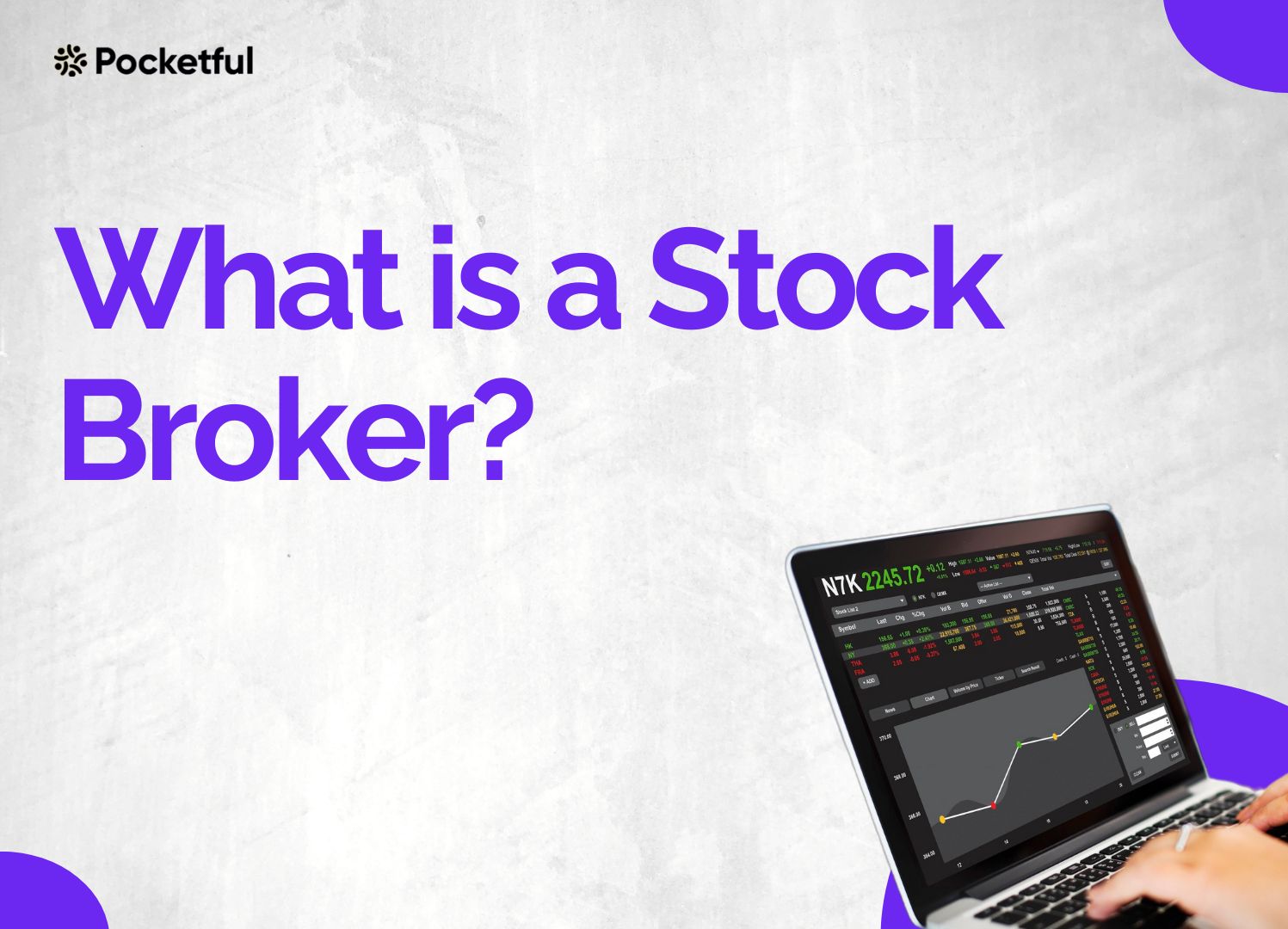| Type | Description | Contributor | Date |
|---|---|---|---|
| Post created | Pocketful Team | May-27-24 |

- Blog
- what is a stock broker
What is a Stock Broker? Meaning, Features, Types, and Commissions Explained

Stock Brokers have become the new talk of the town, but very few know about its importance and relevance in the ever-changing world of finance. They play a crucial role in helping achieve your investment goals while maintaining security and efficiency.
In this blog, we’ll explore the ins and outs of what brokers do, the different types, and why they’re essential for your financial success.
Meaning of Stock Broker

Think of stock brokers as financial matchmakers, linking buyers and sellers in stock markets. They connect traders and investors and facilitate transactions in seconds. Stock brokers are authorized members of the stock exchange (NSE and BSE) and thus charge a commission or brokerage for providing their services.
Read Also: Is It Better To Buy Stocks When The Market Is Up Or Down?
Features of Stock Broker
- Brokers act as an intermediary between investors and the securities market.
- Some brokers are authorized to provide investment advice to their clients.
- Brokers execute buy and sell orders on behalf of their clients.
- Brokers provide customer support to assist clients with managing their accounts, technical issues, and general inquiries.
- Brokers educate their clients regularly through webinars, training, etc.
Types of Stock Broker

There are generally two types of brokers:
- Full-Service Broker – Also known as traditional brokers, they provide other financial services such as retirement planning, investment advice, portfolio management, tax planning, etc, along with facilitating trading in the securities market. The charges levied by them are generally high, and they are considered the most expensive type of brokers. Their offices are situated in different cities in order to provide clients with physical support as quickly as possible. Examples of full-service brokers are Motilal Oswal, Kotak Securities, and Sharekhan.
- Discount Broker – Discount brokers provide only a platform for executing trades and offer the cheapest brokerage. They do not provide any major type of support beyond trades to their customers; thus, investors are required to execute transactions by themselves. Examples of discount brokers are Zerodha, Upstox, Groww, etc.
Types of Participants in Securities Market
- Traders – They are considered intraday traders who buy and sell shares daily; they bet on stocks for short-term profit and exit the positions daily. They are generally uninterested in the company’s fundamentals as they execute their trades based on technical parameters.
- Investors – Investors are generally focused a lot more on a company’s fundamentals; they tend to do comprehensive research regarding the company’s finances, management, etc. before making any investment decision. They invest for a longer period and are not interested in the short-term movement of the stock prices.
How to Identify the Right Stock Broker?

- The selection of a broker depends on your investment style. If you are an active trader, you must look for a broker who will offer you the lowest brokerage to minimize transaction costs. On the other hand, long-term investors tend to prefer brokers who offer educational training, research reports, etc., along with execution services.
- You must check the broker’s registration with the regulating authorities and its past record of default and fines, if any.
- The broker’s trading platforms must be user-friendly, have proper research tools, and have sections that allow traders to make robust decisions in their trading applications while safeguarding their data.
- You must also evaluate the broker’s customer support services and grievance redressal mechanism.
How does a broker Earn Money?
The major sources of revenue for a stock broker are as follows-
- Commission/Brokerage – The brokers charge a commission/brokerage as a fee for executing trade through their platform.
- Account Maintenance Fees – Brokers charge their customers an annual maintenance fee in exchange for continuing to provide online services.
- Margin Interest – Brokers lend money to their clients and charge interest on it.
- Subscription Services – Some full-time brokers charge subscription fees to their customers for the research reports they provide.
Impact on the Stock Market without a Stock Broker

Stock brokers play a significant role in the securities exchange, and without their existence, the stock market would face catastrophic effects. A few of them are mentioned below:
- Reduced Liquidity – The stock brokers provide immense liquidity to the markets with their ability to match orders from buyers and sellers in an instant. Without stock brokers, finding buyers and sellers would be nearly impossible.
- Increased Volatility – Brokers stabilise the market by providing liquidity to traders. They manage large volumes of trades quickly, thus leading to reduced volatility. In their absence, the markets would face erratic price movements, therefore further increasing the bid-ask spread.
- Limited Access for Retail Investors – Stock brokers make it easy for newbies and retail investors (with limited capital) to invest in the market. The broker’s absence would make it exceptionally difficult for retail investors to enter the stock market.
- Higher Costs – The stock brokers work on low margins while keeping the bid-ask spread narrow. Their absence would lead to increased costs due to the widening of the bid-ask spreads.
Read Also: What Happens When a Stock Share is Delisted?
Conclusion
Stock brokers play an important role in the functioning of the stock market. They allow investors to easily access the investment opportunities available in the security market.
However, retail investors need to choose the right broker that aligns with their investing style. Regardless of the broker you choose, you must invest your time in educating yourself about the securities market and its investment strategies.
Frequently Asked Questions (FAQs)
Do I need a stock broker to invest in the securities market?
It is possible to open a Demat account without a broker but to invest in the stock market; you must have a broker who facilitates the transactions.
What is the difference between a full-service broker and a discount broker?
A full-service broker will provide you with additional services along with buying and selling of securities such as PMS, research, etc., while discount brokers will only provide you with a trading platform.
How can I deposit funds with my broker?
Brokers allow you to deposit and withdraw funds digitally through your demat account which is linked with your bank account.
Can I open my demat account with multiple brokers?
Yes, you can open multiple demat accounts with different brokers. However, only one account with a broker is permitted.
Can I buy or sell shares online through my mobile phone?
Yes, most brokers offer a mobile application through which you can buy and sell shares.
Disclaimer
The securities, funds, and strategies discussed in this blog are provided for informational purposes only. They do not represent endorsements or recommendations. Investors should conduct their own research and seek professional advice before making any investment decisions.